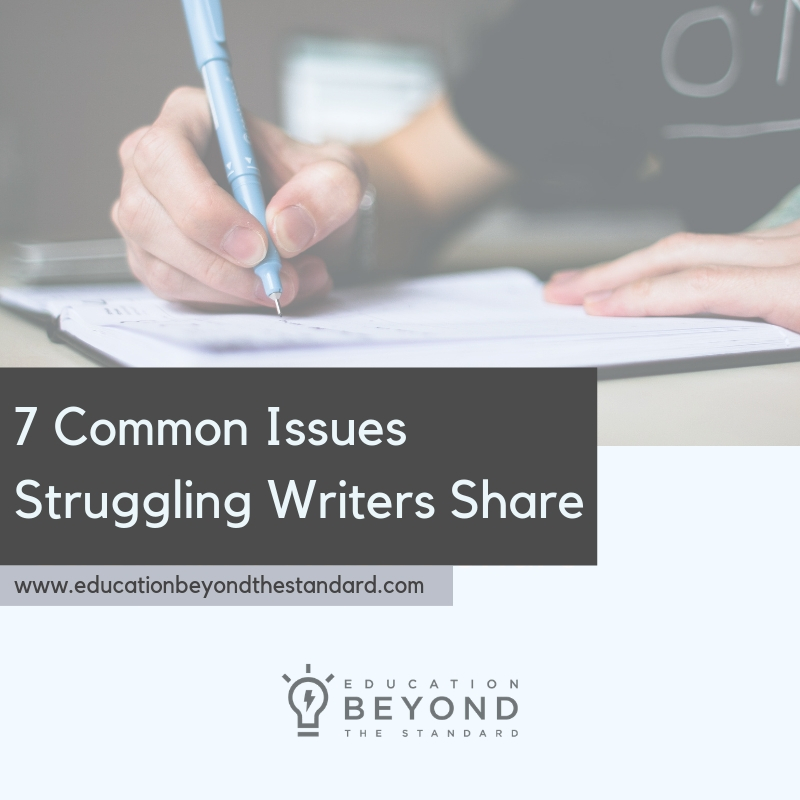7 Common Issues Shared by Struggling Writers
/The importance of good writing skills can’t be understated. While in some respects media and technology advances have changed the way we write (e.g., the prevalence of short statements as in tweets and social media captions, etc.), writing remains a fundamental form of human expression and transmission of ideas.
Despite educators’ best efforts, however, research indicates that a troubling percentage of students graduate from high school with poor writing skills and/or unprepared to write at a college level. Recent studies have shown that up to 3/4 of students across different grade levels lack proficiency in writing.
As teachers we know how difficult it can be to improve students’ writing skills. After all, there is so much that goes into good writing! And just as poor writing skills didn’t develop overnight, strong writing skills take time to develop.
Before looking at some research backed methods for helping students become better writers (in a separate post), I’d like to share some of the patterns and tendencies I’ve noticed in working with struggling writers over the years, both as a former classroom teacher and now tutor.
Struggling writers often lack critical reading skills.
When asked to state the main idea of passage, describe its structure, analyze the development of an argument or theme, etc., struggling writers tend to give vague or unclear responses that are loosely supported by the text. It’s not surprising given that the same skills involved in good, logical, cohesive writing are required for analytical and critical reading. While reading and writing skills don’t go hand in hand 100% of the time, there is a large enough overlap that a weakness in one area typically predicts a weakness in the other.
2. Struggling writers tend to lack understanding of grammar concepts.
These students may not be able to avoid using run-on sentences, for example, because they don’t actually understand what an independent clause/complete thought is. They might not understand on a fundamental level the role of the different parts of speech in a sentence. They might see that they’re getting marked off for the same things over and over again, but they aren’t able to make the connection and master the grammatical concepts involved.
3. Struggling writers often have a hard time editing their writing and/or the writing of others.
These students tend not to read with an eye to detail and, as a result, they often miss all but the most glaring errors. Even when told that there are remaining punctuation issues, for example, they may be unable to find the errors.
4. Struggling writers typically have a hard time identifying or creating a logical sequence of ideas.
It is often not obvious to struggling writers that the order of ideas has a huge impact on the coherence of a text. They tend to view ideas and information as discrete, somewhat related pieces rather than as part of an overall logical flow. When we point out a lack of logical sequencing or organization, they really don’t understand on a fundamental level why a particular sequence of thoughts makes more sense than another.
5. Struggling writers often lack a strong vocabulary.
These students tend to have a limited working vocabulary, a poor understanding of the nuance and connotation differences between words, or both. They may be able to define a word but be unable to use it effectively in an appropriate context. They also tend to be repetitive in their word choice and unaware of redundancies in their writing. If asked to restate an idea in different words, for example, they often struggle to do so.
6. Struggling writers don’t effectively use pre-writing strategies. Alternatively, they may have great difficulty in starting a piece of writing.
One of the biggest tendencies that I notice in the students who struggle with writing is that they usually don’t plan or outline their writing in advance. While some excellent writers can produce great essays without much advance planning, the majority of struggling writers start writing without an effective plan for organization and structure. They tend to resist the planning process unless it is made a mandatory part of the writing assignment (an outline required to be submitted, for example).
On the flip side, struggling writers may remain “stuck” in thinking about their writing assignments. They may have difficulty with writing fluency and knowing how to effectively start a piece of writing without significant prompting.
7. Struggling writers are generally not avid readers.
These students, more often than not, read very little, if anything, outside of what they’re assigned. With the prevalence of sites like Cliffnotes and Sparknotes, many reluctant readers scrape by without even reading assigned texts at all. (For better or worse, kids often tell me, their tutor, about the “shortcuts” they take.) They largely view reading as a task rather than a joy.
There are exceptions to all of the above, of course, and some struggling writers may have only one or two of these issues. In another post, I’ll address the methods I’ve found most effective in helping struggling writers.
Please let me know if you’ve noticed these or other issues with your struggling student writers!



